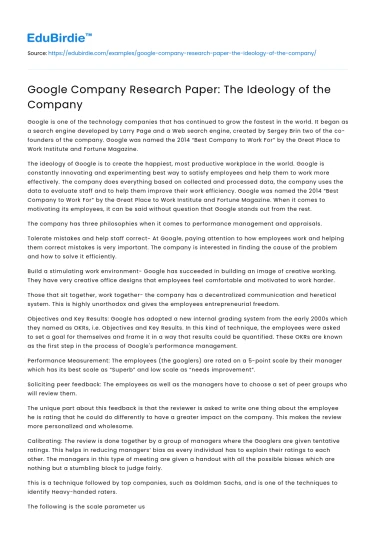Google is one of the technology companies that has continued to grow the fastest in the world. It began as a search engine developed by Larry Page and a Web search engine, created by Sergey Brin two of the co-founders of the company. Google was named the 2014 “Best Company to Work For” by the Great Place to Work Institute and Fortune Magazine.
The ideology of Google is to create the happiest, most productive workplace in the world. Google is constantly innovating and experimenting best way to satisfy employees and help them to work more effectively. The company does everything based on collected and processed data, the company uses the data to evaluate staff and to help them improve their work efficiency. Google was named the 2014 “Best Company to Work For” by the Great Place to Work Institute and Fortune Magazine. When it comes to motivating its employees, it can be said without question that Google stands out from the rest.
Save your time!
We can take care of your essay
- Proper editing and formatting
- Free revision, title page, and bibliography
- Flexible prices and money-back guarantee
The company has three philosophies when it comes to performance management and appraisals.
Tolerate mistakes and help staff correct- At Google, paying attention to how employees work and helping them correct mistakes is very important. The company is interested in finding the cause of the problem and how to solve it efficiently.
Build a stimulating work environment- Google has succeeded in building an image of creative working. They have very creative office designs that employees feel comfortable and motivated to work harder.
Those that sit together, work together- the company has a decentralized communication and heretical system. This is highly unorthodox and gives the employees entrepreneurial freedom.
Objectives and Key Results: Google has adopted a new internal grading system from the early 2000s which they named as OKRs, i.e. Objectives and Key Results. In this kind of technique, the employees were asked to set a goal for themselves and frame it in a way that results could be quantified. These OKRs are known as the first step in the process of Google's performance management.
Performance Measurement: The employees (the googlers) are rated on a 5-point scale by their manager which has its best scale as “Superb” and low scale as “needs improvement”.
Soliciting peer feedback: The employees as well as the managers have to choose a set of peer groups who will review them.
The unique part about this feedback is that the reviewer is asked to write one thing about the employee he is rating that he could do differently to have a greater impact on the company. This makes the review more personalized and wholesome.
Calibrating: The review is done together by a group of managers where the Googlers are given tentative ratings. This helps in reducing managers’ bias as every individual has to explain their ratings to each other. The managers in this type of meeting are given a handout with all the possible biases which are nothing but a stumbling block to judge fairly.
This is a technique followed by top companies, such as Goldman Sachs, and is one of the techniques to identify Heavy-handed raters.
The following is the scale parameter used by a manager as mentioned above:
- Needs Improvement
- Consistently meets expectations
- Exceeds expectations
- Strongly exceeds expectations
- Superb
Output: the meetings that happen generate output for their respective Googlers. Two meetings are held post rating, first where peer and manager’s impressions are given, known as feedback. Secondly,
The calibration meetings output each and every employee’s performance rating for the period. After the rating is closed, managers go on to hold two meetings: one where feedback is given, taking into account peer reviews and managers’ impressions of their employees, and another where compensation and promotion decisions are communicated. The two conversations are held in different meetings and at least a month apart from each other in order to ensure their quality. Google understands that a compensation-focused employee is no good a listener of feedback, whether compensation expectations were not met, met, or exceeded: “a [negative] dynamics exists when managers sit down to give employees their annual review and salary increase. The employees focus on the extrinsic reward – a raise, higher rating – and learning shuts down…. We have an embarrassingly simple solution. Never have the [pay and feedback] conversations at the same time. Annual reviews happen in November, and pay discussions happen a month later.” The theme is also discussed by Prasad Setty, a member of Google’s People & Innovation Lab[3]:
“Traditional performance management systems make a big mistake. They combine two things that should be completely separate: performance evaluation and people development. Evaluation is necessary to distribute finite resources, like salary increases or bônus dollars. Development is just as necessary for so people to grow and improve.”
Separating annual reviews and pay discussions: At Google, annual reviews take place in November and pay discussions to happen about a month later. The hope is that employees want to improve for the sake of contributing more to the company - not because they're motivated by the prospect of a higher salary. Bock cites research that suggests employees perform better in the absence of external incentives like more money. Ultimately, Bock says employees want to be evaluated because they want to grow and eventually become the best at their job. It's up to the employer to show them how to do that.






 Stuck on your essay?
Stuck on your essay?

